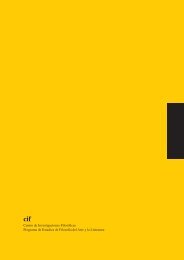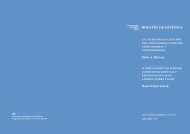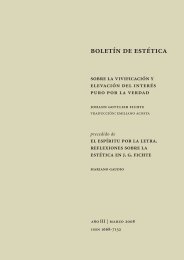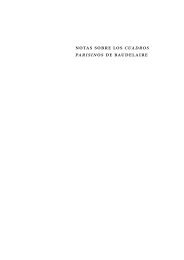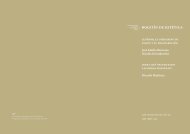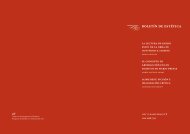Texto completo en formato PDF - BoletÃn de Estética
Texto completo en formato PDF - BoletÃn de Estética
Texto completo en formato PDF - BoletÃn de Estética
You also want an ePaper? Increase the reach of your titles
YUMPU automatically turns print PDFs into web optimized ePapers that Google loves.
BOLETÍN DE ESTÉTICA 14, JUNIO 2010 – ISSN 1668-7132<br />
BOLETÍN DE ESTÉTICA 14, JUNIO 2010 – ISSN 1668-7132<br />
Autonomy and Emancipation. On Friedrich Schiller’s aesthetic-educative<br />
Proposal and the Dialectic of Enlight<strong>en</strong>m<strong>en</strong>t<br />
Abstract<br />
This article aims to introduce the aesthetic education i<strong>de</strong>a of the poet and<br />
philosopher Friedrich Schiller, <strong>de</strong>parting from the c<strong>en</strong>tral notion of autonomy.<br />
In or<strong>de</strong>r to perform this task, the starting point will be the rec<strong>en</strong>t investigation<br />
lines inaugurated by Laura Anna Macor and Fre<strong>de</strong>rick Beiser.<br />
These authors arrive to a new perspective of the Schillerian work, beyond<br />
the traditional conception of it as a mere re-elaboration of the Kantian<br />
Kritik <strong>de</strong>r Urteilskraft. Likewise, some of the diverse Marxist interpretations<br />
of the thought of this author will also be tak<strong>en</strong> in account, in or<strong>de</strong>r to propound<br />
the fundam<strong>en</strong>tal conception of human autonomy and emancipation<br />
in history as the c<strong>en</strong>tral notion of Schiller’s <strong>de</strong>velopm<strong>en</strong>t.<br />
Consi<strong>de</strong>ring the Schillerian work as a manifest self-criticism of the <strong>en</strong>light<strong>en</strong>ed<br />
thought, this study will focus into the possibility of translating this<br />
i<strong>de</strong>al into reality, a problem that Schiller examines, more intuitively than<br />
systematically, in his dramatic work, paradigmatically in his early plays Die<br />
Räuber and Don Carlos, Infant von Spani<strong>en</strong>. Here, Schiller <strong>de</strong>velops a strong<br />
critique of the difficulties involved in the application of the <strong>en</strong>light<strong>en</strong>ed educative<br />
project to reality: its <strong>de</strong>structive pot<strong>en</strong>tial and the possible becoming<br />
fanatic of a freedom i<strong>de</strong>al that disregards the actual historic conditions, both<br />
the individual and the socio-political ones. In or<strong>de</strong>r to overcome this problem,<br />
Schiller precisely proposes his aesthetic education, by which he seeks to<br />
solve the fragm<strong>en</strong>tation and lack of human freedom produced by a unilateral<br />
domain of reason over s<strong>en</strong>sibility.<br />
Keywords<br />
Autonomy –Human Fragm<strong>en</strong>tation– Aesthetic Education– Enlight<strong>en</strong>m<strong>en</strong>t.<br />
INTRODUCCIÓN<br />
Kein M<strong>en</strong>sch muß müss<strong>en</strong>.<br />
Friedrich Schiller 1<br />
Llevar a cabo una acotación <strong>de</strong> la compleja noción <strong>de</strong> autonomía <strong>en</strong><br />
el p<strong>en</strong>sami<strong>en</strong>to <strong>de</strong>l filósofo, poeta y dramaturgo Friedrich Schiller<br />
(1759-1805) no es una tarea fácil. Una posible manera <strong>de</strong> resumir<br />
sumariam<strong>en</strong>te esta i<strong>de</strong>a <strong>en</strong> el caso <strong>de</strong> este autor es la <strong>de</strong> concebirla<br />
como la necesidad <strong>de</strong> la urg<strong>en</strong>te realización <strong>de</strong> la emancipación y libertad<br />
<strong>de</strong>l ser humano como un todo <strong>en</strong> la historia, si<strong>en</strong>do éste el baremo<br />
que el Schiller maduro <strong>en</strong>t<strong>en</strong><strong>de</strong>ría como la pl<strong>en</strong>itud <strong>de</strong>l mismo.<br />
Éste es el hilo que este artículo pret<strong>en</strong><strong>de</strong> seguir, proponiéndose <strong>de</strong>s<strong>de</strong><br />
el principio que dicho problema es precisam<strong>en</strong>te la piedra <strong>de</strong> toque<br />
<strong>de</strong> todo el p<strong>en</strong>sami<strong>en</strong>to schilleriano. De hecho, la c<strong>en</strong>tralidad <strong>de</strong>l<br />
concepto es más que evid<strong>en</strong>te <strong>en</strong> todas y cada una <strong>de</strong> sus obras teóricas<br />
2 , ya sean las referidas a problemas estéticos como los escritos so-<br />
1<br />
Así comi<strong>en</strong>za el escrito <strong>de</strong> Schiller Über das Erhab<strong>en</strong>e (1801): “ningún hombre está<br />
constreñido a obrar por necesidad”. Cfr. Schiller, Friedrich, “Sobre lo Sublime”, <strong>en</strong><br />
Lo sublime (De lo sublime y Sobre lo sublime), estudio <strong>de</strong> Pedro Aullón <strong>de</strong> Haro, traducción<br />
<strong>de</strong> José Luis <strong>de</strong>l Barco. Málaga, Ágora, 1992. p. 101.<br />
2<br />
De <strong>en</strong>tre ellas, la que más se refiere directam<strong>en</strong>te al problema <strong>de</strong> la libertad, <strong>en</strong> relación<br />
con una concepción totalm<strong>en</strong>te política <strong>de</strong> la belleza y <strong>de</strong>l arte, es probablem<strong>en</strong>te<br />
Die Ästhetische Erziehung <strong>de</strong>s M<strong>en</strong>sch<strong>en</strong> in einer Reihe von Briefe (1795-96), <strong>de</strong> la<br />
cual existe una excel<strong>en</strong>te edición bilingüe: Kallias; Cartas sobre la Educación Estética<br />
<strong>de</strong>l Hombre, estudio introductorio <strong>de</strong> Jaime Feijóo, traducción y notas <strong>de</strong> Jaime Feij-<br />
6<br />
7



